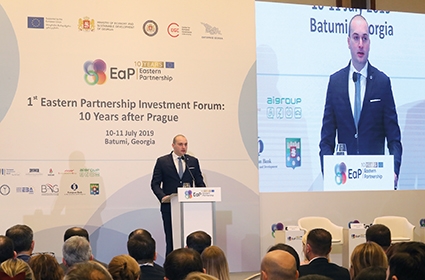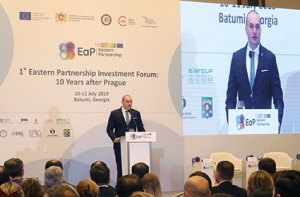1st Eastern Partnership Investment Forum Held in Batumi
The 1st Eastern Partnership Investment Forum, titled ‘10 Years After Prague’ was held on July 10-11th in Batumi, Georgia. The Forum was a complementary event to the 16th Batumi International Conference in Georgia, which was attended by guest of honor European Union (EU) Council President Donald Tusk, and EU and Eastern Partnership (EaP) ministers, political leaders, international organizations, civil society and media representatives. More than 500 participants attended the conference.
The main objective of the EaP Investment Forum is to promote new investment opportunities and cooperation between the EU and the Eastern Partnership Countries, explain the Forum organizers, which included the Center for European Governance and Economy, the European Commission, the Georgian Ministry of Foreign Affairs, the Georgian Ministry of Economy and Sustainable Development, and Enterprise Georgia.
The Eastern Partnership consists of Georgia, Armenia, Azerbaijan, Belarus, Moldova, and Ukraine. Together, the populations of the EaP countries total 75 million and their economies are worth more than EUR 200 billion annually.
The Forum featured heavy-hitting speakers including Donald Tusk, Georgian Prime Minister Mamuka Bakhtadze, and European Investment Bank Vice President Vazil Hudak, among others. After a networking reception on Wednesday, on Thursday the Forum began in earnest with thematic panels on infrastructure and energy and on agriculture and manufacturing, followed by government-to-business (G2B) and business-to-business (B2B) meetings. Additionally, during the forum, a new catalogue of investment projects from all the Eastern Partnership countries was presented.
The Forum was sponsored by the European Investment Bank, the Business Association of Georgia, and the Autonomous Republic of Ajara. Partners of the Forum were the Georgian Chamber of Commerce and Industry, the European Business Association, and the European Bank for Reconstruction and Development.
Within the framework of the 1st EaP Investment Forum, Georgian Minister of Economy and Sustainable Development Natia Turnava held several high-level meetings, including the Hungarian Minister of Foreign Affairs and Trade, Péter Szijjártó. During that meeting, the pair discussed trade and economic relations between the two countries, including the strong potential for bilateral trade, and agreed that more active steps should be taken to strengthen economic ties. Turnava also met with Secretary General of the International Energy Charter Treaty, Urban Rusnák, with whom she discussed ongoing and upcoming reforms in the energy sector, with a particular focus on the liberalization of the energy market and the development of regulations regarding renewables and energy efficiency. The sides agreed that the implementation of relevant reforms “will facilitate the development of the electricity trade with neighboring countries and the European Union, establishing Georgia as a regional hub and encouraging energy efficiency measures, using renewable energy sources,” reports the Ministry of Economy and Sustainable Development. Secretary General Rusnák expressed his approval of and support for ongoing energy reforms in Georgia.
During a panel titled ‘Challenges and Opportunities for Investment in Eastern Partnership Area – 10 Years after Prague,’ Turnava said that “The key philosophy and the primary values of the Georgian government are to ensure economic development, security and democracy.”
While addressing the crowd, Turnava described Georgia’s economic policy and governmental priorities, noting that the country’s economic and business climate model is necessarily based on being open and attractive for FDI, due to its lack of valuable natural resources. Thus, the country prioritizes maintaining a secure and predictable political environment and moving towards a technology-and knowledge-driven economy. The “economic policy of the Government of Georgia is based on the free market principle, with a special emphasis on private sector development and macroeconomic stability. In line with macro stability, institutional strength represents a solid background for economic development and increasing confidence towards our country,” said Turnava.
She also explained to participants that the country’s economic growth has been largely supported by structural reforms and the reform agenda outlined by the DCFTA (Deep and Comprehensive Free Trade Agreement between Georgia and the EU). “Georgia’s economy proved resilient to significant economic and financial shocks in the region in 2014-16 and its GDP growth averaged 3.5% during this period, while many of our neighbors were in or close to recession," she boasted.
Turnava pointed to international credit ratings to make her argument that Georgia managed to maintain “a stable macroeconomic environment and continuous implementation of economic reforms…Moody's Investors Service has upgraded Georgia’s sovereign credit rating from Ba3 to Ba2. Just as importantly, in February 2019, the credit rating agency Fitch upgraded Georgia's rating to 'BB' from 'BB-' with a stable outlook.”
“Georgia, as a country of only 3.7 million people, may seem to be an unprofitable market. However, if you look at Georgia as a regional hub, then it is a completely different story. We see Georgia as a gateway to not only the South Caucasus but also to Central Asia, the European Union and then further to western and eastern Markets,” Turnava said.
By Samantha Guthrie
Image source: Ministry of Economy and Sustainable Development











